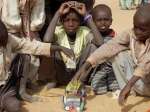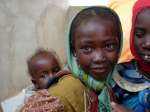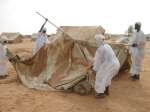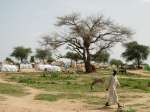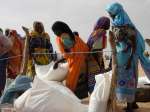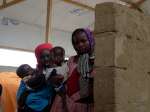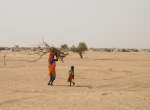UNHCR condemns attack on displaced in western Chad, pledges more help
News Stories, 13 October 2015
GENEVA, Oct 13 (UNHCR) – The UN refugee agency today strongly condemned two suicide attacks last weekend in western Chad in which a total of 47 people, including many people uprooted as a result of violence in northern Nigeria, were killed and dozens more injured.
"UNHCR deplores the violence and mourns the loss of life caused by suicide attacks at the weekend in the western Chad town of Baga Sola," UNHCR spokesperson Leo Dobbs told a press briefing in Geneva.
Dobbs said UNHCR was particularly concerned about the attack at the Kousseri site for internally displaced Chadians in Baga Sola.
"(This) left at least 22 people dead in an area where UNHCR and other humanitarian agencies have been trying to help provide protection and assistance to tens of thousands of people displaced from their homes by the conflict with Boko Haram," he added.
Dobbs said local and UN security reports indicated five suicide bombers, three women and two children, had attacked both the market and then the Kousseri site on the outskirts of Baga Sola on Saturday afternoon. At least, 25 people were killed in the market attack.
The latest toll at the two locations stands at 47 people dead with dozens injured. The most serious cases were flown by helicopter to the Chadian capital, N'Djamena.
UNHCR works with other agencies in a refugee camp known as Dar Es Salam, 10 kilometres from Baga Sola.
"All our staff in the area and the 7,139 refugees from Nigeria and Niger in the Dar Es Salam camp are safe, but we have suspended travel to and within the Lake Chad region. UN flights are on standby to evacuate people or bring in emergency supplies," Dobbs said.
In recent weeks, UNHCR has stepped up assistance to some 60,000 internally displaced people in the lake area, distributing vital non-food items to more than 32,800.
"Many of these people were relocated from their island homes earlier this year as Lake Chad effectively became a war zone," Dobbs explained, adding that living conditions overall were dire.
"Most are short of food, shelter and medical attention. Their makeshift shelters, some made with flimsy mosquito nets, provide little protection against insects or the elements during the current rainy season."
He said other agencies including MSF, WFP, UNICEF and the Red Cross Movement were also responding to the humanitarian needs of IDPs. Aside from aid distributions, UNHCR has also supported the government by transporting food items from the capital for the displaced in the lake area, including rice, oil and sugar.
Dobbs said the attack on Baga Sola had shown how vulnerable and isolated the displaced were in the lake area, but said UNHCR welcomed the government's determination to improve security.
"UNHCR remains committed to help the displaced in western Chad and we urge the international community to support Chad as it addresses this," he declared.
The attack in Baga Sola, the first on the town, came a day before female suicide bombers killed another nine people in Kangaleri, northern Cameroon.
Chad hosts some 438,000 refugees, including 350,000 Sudanese, 90,000 from Central African Republic and some 13,000 Nigerians.
For briefing note: UNHCR condemns attack on displaced in western Chad, pledges continued help





